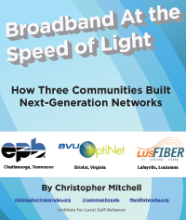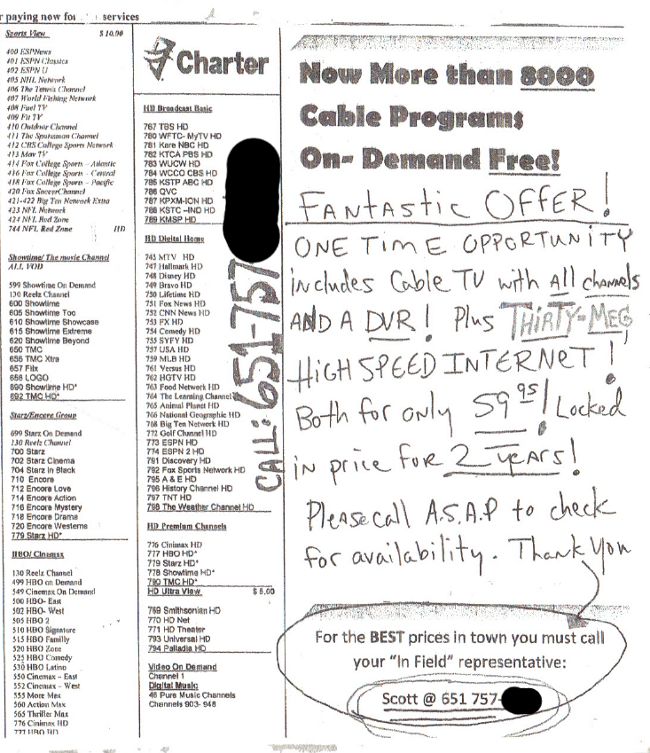
Fast, affordable Internet access for all.

Last week, South Carolina's General Assembly passed H3508, the ALEC and AT&T bill we previously warned you about. AT&T, ALEC, and cable companies pushed this bill to limit broadband competition and revoke local authority to decide if public investments in broadband infrastructure are wise.
H3508 is one of the worst pieces of legislation we have seen. States usually incorporate language that "grandfathers in" existing projects as a way to avoid legal challenge and federal scrutiny of their anti-competition legislation. In South Carolina, however, crafty drafting puts one county BTOP project in the cross hairs while permitting two other projects to continue.
Below is a roundup of media coverage of the bill. We will soon release our analysis of the supposed "exemptions" to this bill but in the meantime, this coverage explains several of the problems with South Carolina's latest Monopoly Protection Act.
Ars Technica's Cyrus Farivar contacted Jim Baller, a preeminent telecom attorney and expert in broadband issues:
"States have different ways to achieve the same end—discourage, delay, or derail public broadband initiatives," wrote Jim Baller, a telecom lawyer based in Washington, DC, in an e-mail to Ars on Thursday. He noted that similar bills were introduced in Minnesota and Georgia this year, the former of which has led to a "study bill," while the latter did not make it out of committee.
"In some ways, the South Carolina bill is worst of all because it does not grandfather existing projects and would retroactively undermine federal stimulus grants that Orangeburg and Oconee Counties have received," he added.

Farivar also looked into the chief author and found:
Yesterday the South Carolina Senate voted in a second reading of H 3508, a bill that has been debated in the State Legislature since it was introduced in January of 2011. The bill, pushed by AT&T and ALEC, has been on our radar for quite some time.
We have watched this piece of legislation because it will have immediate and unfortunate negative implications for the people of South Carolina. Right now, the state has a miserable adoption rate with an average of 53 out of 100 households connected. Like many other states in the South, poverty, geography, and lack of interest from the major carriers have left South Carolina behind the rest of the country.
The bill will revoke local authority to pick up the slack where the private industry has failed. If this bill passes, South Carolina will entrust its future to AT&T, which has admitted it has no solution for rural broadband. And in the meantime, it is ripping off our schools and libraries, as revealed in a recent ProPublica article examining E-rate Program.
If you live in South Carolina, call your elected officials and let them know you are a constituent and you believe communities should make these decisions locally.
Find your legislator here. Tell them to oppose H.3508 and any efforts to limit local authority to make decisions about broadband.
Free Press caught and isolated an excellent question from Senator Frank Lautenberg (D-NJ) to FCC Chairman Genachowski during recent hearings. The Senator notes that many Americans do not have sufficient access to broadband but 19 states have enacted barriers to make it harder for communities to build their own.
FCC Chairman said he thinks innovative municipal solutions should be encouraged and that he looks forward to working with the Committee to address the obstacles.
In an effort to improve the area’s economic prospects, county officials have worked in recent years to secure funding to refurbish roadways and sewer systems—but they also know that, in a globalized marketplace, old-school infrastructure is not nearly enough. That’s why, in 2009, Orangeburg County applied for, and received, $18.65 million in stimulus money to finally give the area access to high-speed broadband internet. County Administrator Bill Clark and his colleagues envisioned a municipal, or muni, network that could reach roughly a quarter of Orangeburg’s rural population, including just over three thousand households and one hundred businesses. ... But the titans of telecom aren’t operating on quite the same wavelength. Since last January, AT&T, CenturyLink, and Time Warner have contributed just over $146,000 to politicians in South Carolina who back legislation that would cripple networks like Orangeburg’s. It’s only one example of a broader campaign by telecom companies to protect their cartel at all costs—even at the expense of keeping the country’s poorest on the wrong side of the digital divide for many years to come.Same story, different state. We've seen the same efforts across the U.S., which is why nineteen states have created barriers to community broadband. Meanwhile, the source of a lot of those barriers -- the American Legislative Exchange Council -- or ALEC has been getting attention for the many bad bills they have ushered through state legislators.

Bill Tapper, who owns a cabinet company with clients around the world, recalls a time just a few years ago when the Internet was so slow it hurt business. "The service we had in Monticello was horrible," he said. "My employees would sometimes take the data home where they had a better Internet connection than we did and do their uploads at night." Tapper said he lost out on business, but at the time the established Internet service providers like phone and cable TV companies told Tapper and other frustrated business owners in town that the city was wired sufficiently.

After the community voted in favor of a publicly owned fiber-optic network, the incumbent provider, TDS, filed a lawsuit. The lawsuit strategically succeeded in stalling the development of the new network but did not destroy the project. Even though the incumbent provider describes pre-network status as "just fine before the city got involved," TDS took advantage of the delay they caused to began building their own fiber network. Currently, subscribers in Monticello are benefitting from their high-speed fiber in ways beyond expanded and improved access.
Here at muninetworks.org, we continually see instances of state government preempting rights of local government to make their own decisions on broadband. It was no surprise to us to read Josh Goodman’s recent Stateline.org article, GOP Legislatures Try to Limit Local Government’s Power.
Goodman takes a look at a disturbing trend in the relationships between local and state authority; a relationship that has local government walking on eggshells. More and more local governments are now contending with their own state legislatures stripping them of specific decision-making authority. Some decisions are better made at the state level, but the concept of a micromanaging, conservative GOP legislature seems contradictory. Any fan of state floor debate, has listened to countless hours of republican legislators berating democrats for trying to overstep into local concerns. Could it be a change of heart or perhaps a very targeted way to ensure local compliance with a party agenda?
Many of these state lawmakers have accused the federal government of adopting an imperious, one-size-fits-all mentality and of subverting the rightful powers of states. At the same time, many high-profile debates in the Tennessee Capitol over the last two years — on topics such as local wage rules and local non-discrimination rules, among others — have centered on the state trying to limit the power of localities to make decisions for themselves.
Rather than take a diplomatic and collaborative approach, these lawmakers prefer to nullify local authority rather than risk a community decision with which they would disagree.
A little less than a year ago, the 88th Arkansas General Assembly created HB 2033, later known as Act 1050 [pdf]. The law made a few changes to the Telecommunications Regulatory Reform Act of 1997 and, while “a few changes” may not sound like much, they don’t need to be much in order to have a significant effect on the prospect of municipal broadband in Arkansas. The language gets specific about municipal broadband, related services, and alters the possibilities in Arkansas.
WHO AND WHAT...
Prior law prohibited any government entity from offering, directly or indirectly, basic exchange services. So, an Arkansas town couldn’t create its own telephone company that offered the traditional concept of telephone service, as defined in statute.
Act 1050 expands the prohibition to data, broadband, video, and wireless. With the exception of those owning municipal electric utilities or cable television systems, Arkansas towns are now prohibited from offering broadband services to nonpublic entities.
EVERYBODY EXCEPT…
Prior law allowed an exception for government entities owning municipal electric systems or television signal distribution systems to be able to make telecommunications capacities associated with the facilities available to the public. Offering basic local exchange services was still prohibited.
Act 1050 actually opens up the uses of those networks that may have been created for the use of the electric system or television signal distribution system. The new language adds permission to use those capacities to provide, directly or indirectly, voice, data, broadband, video, and wireless. There is even an insertion that allows for like use in future constructed or acquired facilities. Reasonable public notice and a hearing are required, which is the normal course of action before making new investments.
SOME SPECIAL CONSIDERATIONS…
According to a report by the National Institute on Money in State Politics, Dialing Up the Dollars: Telecommunication Interests Donated Heavily to NC Lawmakers, Republican lawmakers and those who held key leadership positions, sponsored the bill, and/or who voted in favor of the bill received considerably more campaign contributions from the telecommunication donors than did their colleagues. For example, lawmakers who voted in favor of HB 129 received on average 76 percent more than the average received by those who voted against the bill. The four primary sponsors of the bill received an average of $9,438 each, more than double the $3,658 given on average to lawmakers who did not sponsor the bill.Recall that Time Warner Cable pushed this bill for years with some help from AT&T, CenturyLink, and others that stood to benefit by limiting broadband competition. But the Legislature wisely refused to enact it... until 2011. Now we have a better sense of what may have shifted the balance. Consider this:
Thom Tillis, who became speaker of the house in 2011, received $37,000 in 2010–2011 (despite running unopposed in 2010), which is more than any other lawmaker and significantly more than the $4,250 he received 2006–2008 combined. AT&T, Time Warner Cable, and Verizon each gave Tillis $1,000 in early-mid January, just before he was sworn in as speaker on January 26. Tillis voted for the bill, and was in a key position to ensure it moved along the legislative pipeline.Running unopposed for office, he collected more money from the cable and phone companies than any other Representative and almost 10 times as much as in the previous two cycle combined. As Speaker, he set the agenda and decided priorities.
 Download a higher resolution PDF here.
Charter has taken a package for which it charges $145/month in Rochester, Duluth, Lakeville, and nearby Buffalo (MN) and is offering it for $60/month - price guaranteed for 2 years. A Monticello resident supplied us with this flyer, which this person had received multiple times at their home over the course of a month. (See below for the full flyer).
Download a higher resolution PDF here.
Charter has taken a package for which it charges $145/month in Rochester, Duluth, Lakeville, and nearby Buffalo (MN) and is offering it for $60/month - price guaranteed for 2 years. A Monticello resident supplied us with this flyer, which this person had received multiple times at their home over the course of a month. (See below for the full flyer).
 This is either predatory pricing or the cable industry is out of control with its rate increases. If that package costs Charter more than $60/month to supply, then it is engaging in predatory pricing to drive competitors out of the market. Consider that Charter may be taking a loss of $20/month ($240/year) from each household that takes this offer.
This is either predatory pricing or the cable industry is out of control with its rate increases. If that package costs Charter more than $60/month to supply, then it is engaging in predatory pricing to drive competitors out of the market. Consider that Charter may be taking a loss of $20/month ($240/year) from each household that takes this offer.